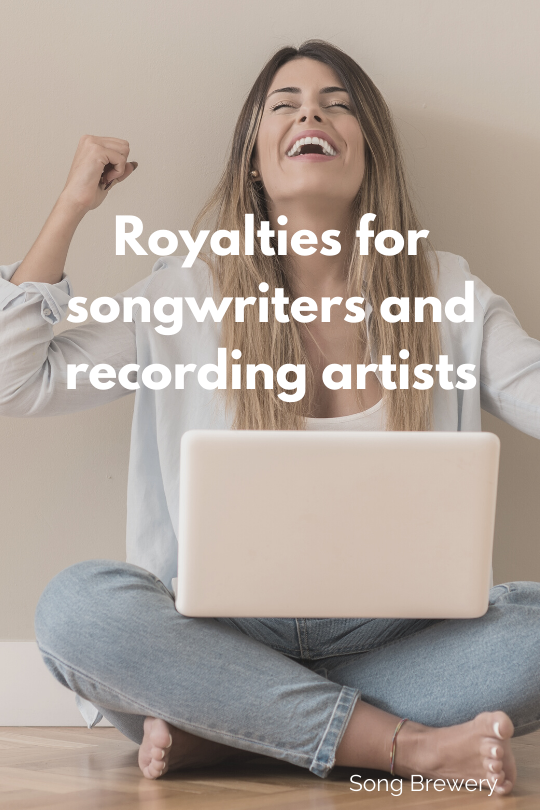As a songwriter and recording artist trying to make a living out of your music, understanding various kinds of royalties that can be collected is crucial. We have discussed the basics before right HERE.
Today´s post is designed to give an overview of the most important royalty types and how they are being collected and distributed.
First let´s take a look at royalties derived from the copyright in a song. This concerns the actual songwriters and their publishers who created and manage the song (a song being defined as “melody and lyrics”). The moment a song is written, it is copyrighted. You need not record the song for that matter.
The most important royalties owed to song copyright owners:
Public Performance Royalties
Public performance royalties are being collected each time a song gets played in public or private settings in the form of radio airplay, TV broadcasting, streaming or live performances. It doesn´t matter which sound recording is being used, or whether it is a live performance of a one man band or a big orchestra. Each time the song (in whichever form) is being played via one of these platforms (Radio, TV, Steaming, Live) the songwriters/publishers involved get paid a royalty.
Mechanical Royalties
A mechanical royalty comes into play whenever an actual sound recording (a recorded version of your song) gets sold, either via a digital download or via a physical sale, such as CD, Vinyl, tape sales…you name it. The term “mechanical royalty” stems from the pre-digital era and used to refer to physical sales. Nowadaways, digital downloads are being included. No matter whether a songwriter released the song themselves or if another artist did a cover of it, the songwriters and their publishers always get a piece of the pie from each song sale.
Digital Mechanical Royalties
There are also digital mechanical royalties. Now, don´t get confused. I mentioned digital downloads of songs under „mechanical royalties“. Then what do digital mechanicals refer to you might wonder? Now, this refers to interactive streaming. You see. A stream that comes without advertising and that you can pause and play whenever you want (on demand) is technically sort of in between a stream (public performance) and a download. It is more like a download though, as the songs aren’t curated and aired live via an actual aggregator. Instead you can sort of “consume” the song as though you had downloaded it, it just isn´t stored on your hard drive. So, that´s what digital mechanical royalties refer to. The MLC collects these mechanicals for songwriters and publishers in the USA.
Keep in mind: A regular song download (via the Apple i tunes store or Amazon) is considered a regular mechnical (not a digital mechanical).
Sheet Music Royalties
Sheet music can be really lucrative if you landed a hit or your song is being played by orchestras and the likes. Classical compositions can profit a lot of such sheet music sales. The songwriters and publishers of a song earn from each sale of their musical notations.
Lyric Royalties
Similar to Sheet music, publishing your lyrics on websites like LyricFind.com can really pay off.
Next, let´s look at royalties derived from the copyright in the sound recordings of a song (this concerns labels, indie artists, producers or singer/songwriters, in short whoever owns the master recordings)
Any recording of a song is called a master recording (or sound recording). Like the song itself (melody and lyrics), the creation of an actual recording of said song (and therefor a specific interpretation/performance of said song on a recording inlcuding a certain arrangement and production style) is copyrighted as well. A lot of times the ownership in such copyrights are with the label that financed the recording, or sometimes the artists themselves or the producers or sometimes a songwriter who initiated and ordered that recording.
Royalties owed to Master Recording owners are:
Master Recording and Neighboring Rights Royalties
In the USA “neighboring rights royalties” are collected via SoundExchange. You can register with SoundExchange if you are a master owner, but also if you are a vocalist or musician that played or sang on a recording. The so called “neighboring rights” refer to the people involved in a recording (that is the master owners as well as the recording artists and musicians). The main artist (often a vocalist) gets paid via SoundExchange directly just like the master owner (that is if they are registered with SoundExchange in the first place), whereas the money for all other musicians on the track goes to SAG-AFTRA (Note: That only refers to the US system) who will then pay the musicians.
Direct Sales Royalties
Needless to say, that master recording owners also receive streaming and download royalties from their DSPs or distributors of whichever kind as well as a huge share in all physical song sales.
Last not least…
There are of course many other streams of income, such as sync licenses and merchandise etc. The above royalty overview is meant to cover the most important ones, that you should definitely keep an eye on, when releasing music.
Legal disclaimer: Please be advised that nothing in this blog constitutes legal advice. It is merely an analysis of what can be accessed publicly via websites and brochures. Keep in mind that laws and business standards might change over time, so the information might be outdated soon. Also, none of the corporations referred to in this blog are in any way affiliated with us.
If you enjoy our content, make sure to follow us on Instagram
and do sign up to our newsletter below to stay up to date on new posts and exclusive events and tips!


